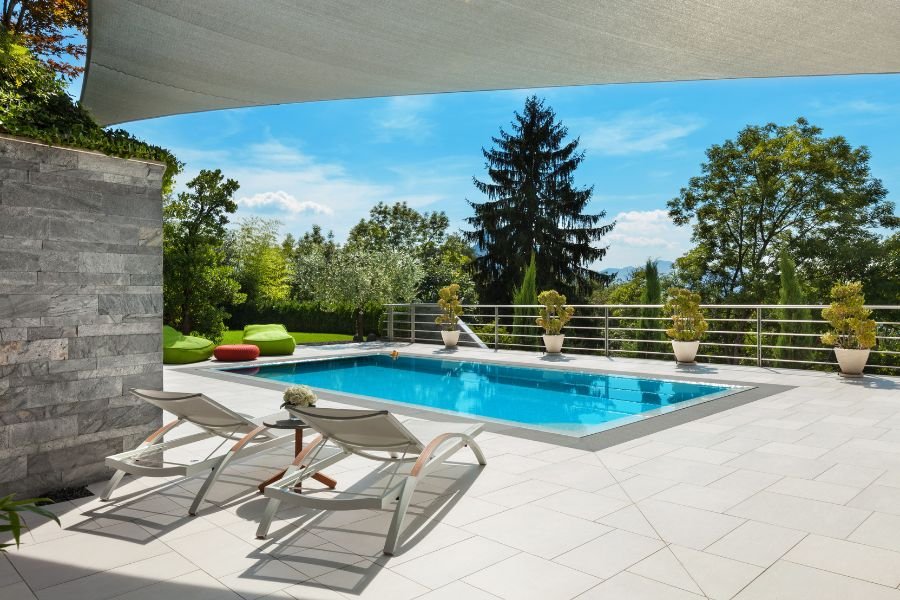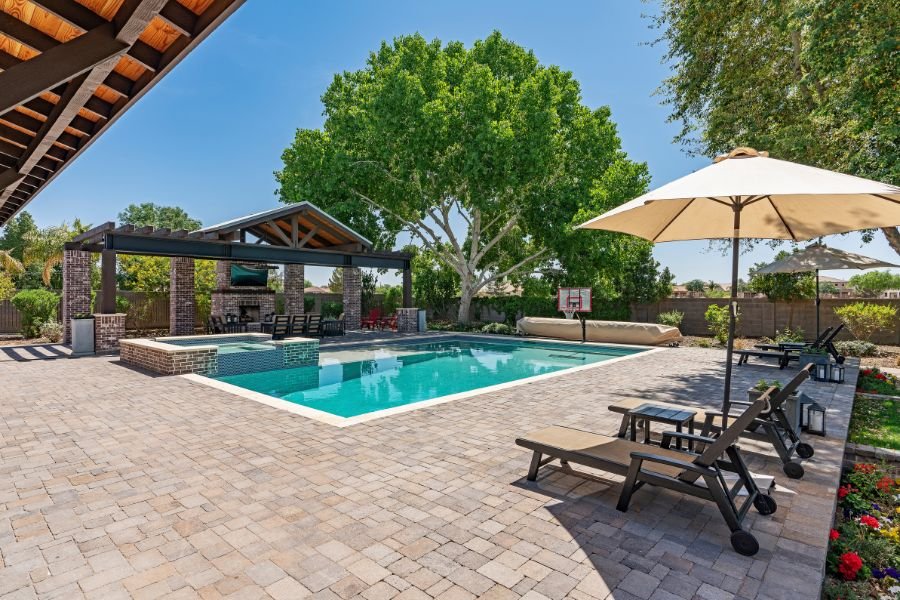You’ve probably heard it takes 6-8 weeks to build a pool. What they don’t tell you is that’s after permits are approved. The time it takes to review your plans varies based on the type of project, but expect at least 2-4 weeks for residential projects, longer if you need variances or special approvals
Here’s a pro tip from someone who learned the hard way: You may request a pre-application meeting with a planner who can answer questions about zoning, construction permits, and more. It’s like getting the test answers before the exam — completely legal and surprisingly helpful.
When Your Property Plays Hard to Get
Not all backyards are created equal. If your property sits in a floodplain, has unusual topography, or backs up to a lake, you’re entering what I call “the special circumstances zone.” Properties within the 100-year floodplain require additional submittal requirements, including elevating all mechanical and electrical equipment at least one foot above the base flood elevation.
Got a lakefront property? The setback jumps from 5 feet to 15 feet from the water line. Planning a screen enclosure with that pool? If the enclosure height exceeds 12 feet, you’ll need a 50-foot setback from the lake. It’s enough to make your head spin, which is exactly why most homeowners end up calling in the professionals.
The Digital Revolution That Changed Everything
Remember when getting permits meant taking a day off work to stand in line at City Hall? Those days are mercifully behind us. The City of Orlando Permitting Division accepts and reviews plans digitally via online services. After your application is processed, you’ll get an email link to ProjectDox, their digital plan review system.
You can search for permits using the project name, parcel number, or permit address — no more frantically searching for that permit number you swore you wrote down somewhere. The Fast Track system even allows you to pay fees on multiple permits simultaneously with one credit card payment. It’s almost… dare I say it… convenient?
The Elephant in the Backyard: Why Skipping Permits Is Never Worth It
Let me paint you a picture. You decide to skip the permits, save a few thousand dollars, maybe even get your pool built faster. Two years later, you’re selling your house. The buyer’s inspector takes one look at your unpermitted pool and suddenly your $50,000 pool becomes a $50,000 liability.
Or worse — and this happens more than you’d think — something goes wrong. A pump fails and floods your neighbor’s house. A guest gets hurt. Your homeowner’s insurance takes one look at your unpermitted pool and walks away whistling. That money you “saved” on permits? It just cost you everything.
How Aqua Elite Pools Makes This Mess Manageable
Now, here’s where I tell you something that might save your sanity: you don’t have to navigate this labyrinth alone. Professional pool builders like Aqua Elite Pools™ handle permits the way a seasoned pilot handles turbulence — calmly, competently, and with the confidence that comes from having done this countless times before.
They know that projects valued at more than $5,000 require filing a Notice of Commencement with the Orange County Comptroller’s Office first, then with the City of Orlando. They understand the dance between city and county requirements, the difference between Orange County proper and City of Orlando jurisdiction, and exactly which inspector needs to see what and when.
More importantly, they’ve built relationships with the permitting offices. When that obscure question about setback variances comes up, they know who to call. When plans need revision — and they almost always do — they know how to navigate the revision process without starting from scratch.
The Unexpected Poetry of Pool Permits
There’s something almost poetic about the pool permit process when you step back and look at it. Every requirement, every inspection, every safety measure represents someone’s story — usually someone’s tragedy turned into prevention. That fence height requirement? Some parent’s worst nightmare transformed into protection for others. Those electrical bonding requirements? They exist because someone, somewhere, didn’t come home.
Florida has year-round sunshine and warm temperatures, making a backyard pool the ultimate way to relax, entertain, and stay cool. But with that blessing comes responsibility. The permit process isn’t trying to keep you from your dream; it’s trying to keep your dream from becoming a nightmare.
Your Next Move in the Pool Permit Game
So where does this leave you, standing at your kitchen window, still dreaming of that perfect pool? Here’s my advice, learned from watching dozens of neighbors go through this process:
Start with a consultation. Whether it’s with Aqua Elite Pools or another reputable builder, get someone who knows the Orlando permit landscape to assess your property. They’ll spot the challenges you don’t even know exist yet.
Request that pre-application meeting with city planners. It costs nothing but time and can save you thousands in revision fees later.
Budget for permits from the start. That $2,000 to $10,000 isn’t a surprise fee; it’s part of the investment in doing things right.
And most importantly? Don’t let the process scare you away from your dream. Yes, it’s complex. Yes, it takes time. But somewhere in Orlando right now, a family is floating in their perfectly permitted pool, watching the sunset paint the sky pink and orange, thinking it was all absolutely worth it.
The Bottom Line on Your Pool Paradise
The path from dream to swim isn’t always straight, and it’s definitely not simple. But in a city where new pool permits are holding steady with thousands of pools being built each year, clearly it’s not impossible either.
The permit process is like a good pool filter — it might slow things down, but what comes through on the other side is cleaner, safer, and built to last. Every form filed, every inspection passed, every requirement met is another stone in the foundation of your backyard paradise.
The sound of running water isn’t just relaxing — it’s the heartbeat of a home built for peace. But first, it needs to be a home built to code. The good news? With the right team, the right information, and the right expectations, that sparkling oasis in your backyard is closer than you think.
Just remember to wave at your kitchen window on your way to that first dive. That person standing there with the cold coffee and big dreams? They had the vision. You just had to wade through some paperwork to make it real.
At Aqua Elite Pools we don’t just build pools. We build them right!
About the Author: With over 15 years of engineering excellence and more than $60M in successfully managed construction projects — from luxury high-rise towers to award-winning commercial developments — Henri founded Aqua Elite Pools™ on a principle learned through decades of high-stakes builds: luxury execution requires engineering discipline. At Aqua Elite, every promise is backed by precision project management and structural integrity, because your family’s investment deserves both beauty and reliability that lasts for generations.About the Author: With over 15 years of engineering excellence and more than $60M in successfully managed construction projects — from luxury high-rise towers to award-winning commercial developments — Henri founded Aqua Elite Pools™ on a principle learned through decades of high-stakes builds: luxury execution requires engineering discipline. At Aqua Elite, every promise is backed by precision project management and structural integrity, because your family’s investment deserves both beauty and reliability that lasts for generations.



